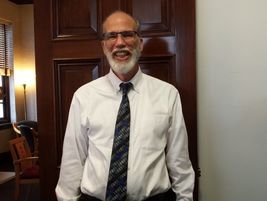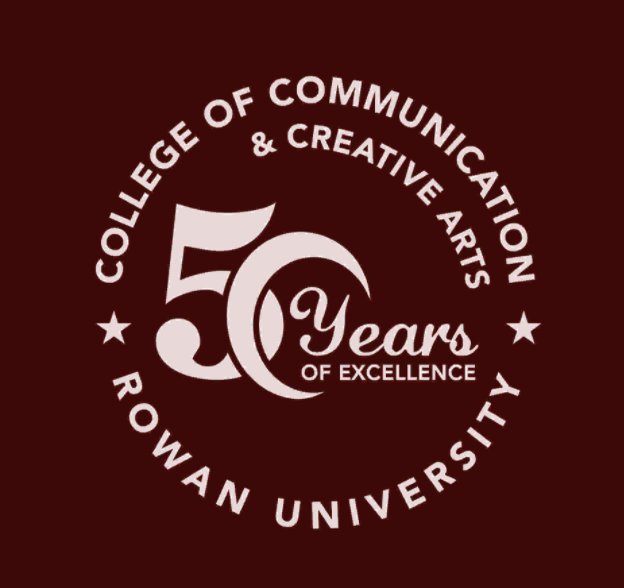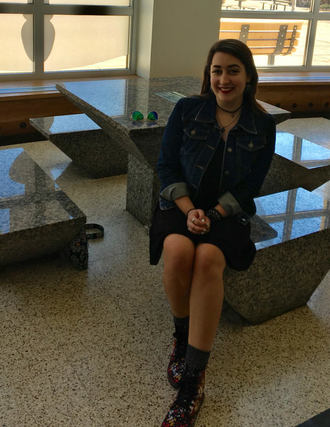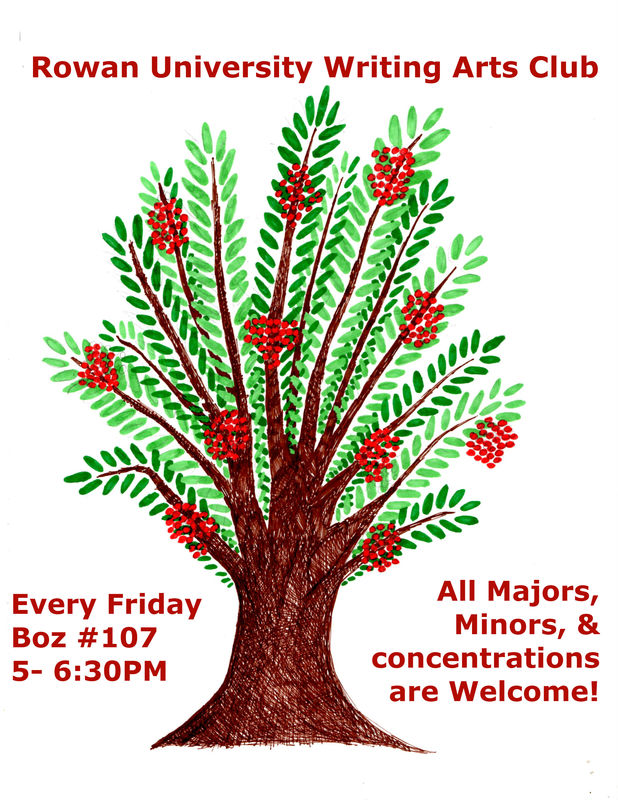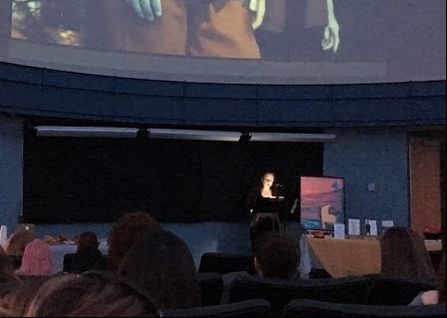The Writer's Insider
|
Vol 1. Issue 5
|
Spring 2017
|
Downloadable pdf version |
| ||||||
Technical and Professional writing
|
Easing the Tension: Breaking Down Technical and Professional Writing
Defining the crafts of technical and professional writing and their roles in the Writing Arts department. |
Growing the Technical and Professional Writing Concentration
The exciting future of the Technical and Professional Writing Concentration.
The exciting future of the Technical and Professional Writing Concentration.
Dr. Sandford Tweedie: CCCA Dean
By Ellie Leick
|
Dr. Sanford Tweedie, the new permanent dean of the College of Communication and Creative Arts, didn’t always picture a career in higher education.
Tweedie did not put a lot of thought into school as an undergraduate. He chose English as his major because he needed to finish in three years due to his ill father, and he already had a few credits in that subject.
After graduating with a bachelor’s degree in English, Tweedie traveled to California for graduate school, but dropped out before the first semester was over.
|
|
Tweedie returned home to Michigan and decided to teach high school English. At the time, Michigan required certification to teach in two subject areas, so Tweedie went back to school to study English language to accompany his English literature background.
|
|
The professor in Tweedie’s psycholinguistics class suggested Tweedie apply to be his research assistant. While filling out the application, Tweedie noticed there were two boxes he could check: research assistant and teaching assistant. Tweedie’s professor suggested he check both and to take the teaching assistantship if he got it because it paid more.
|
|
Tweedie was offered the teaching assistant job and began teaching at 22 years old. After receiving his master’s degree, Tweedie attended a Ph.D. program for education at the University of Wisconsin-Milwaukee where he also worked as a teaching assistant.
|
|
Tweedie began working at Rowan two years after Henry Rowan made the donation of $100 million in the Department of Communications in 1994, expecting it to just be a stepping stone in his career. At the time, there were only five writing courses, which included first-year writing and business writing
|
|
Despite Tweedie’s initial impressions of the university, he soon found it was growing rapidly and provided immense opportunity. Tweedie helped create the multiple majors and minors during his 23 years at Rowan. In 2013, Tweedie became the chair of the Department of Writing Arts.
|
|
“It was really interesting for me to come into a Department of Communications because I had come out of three English literature departments, and there was a totally different world where people where the emphasis was on production,” Tweedie said. “Yes, [in English] you do lots of reading. Yes, you do lots of film viewing and lots of critical analysis of lots of things, but [communication and creative arts] was more about the production whereas English literature it’s more about consumption and analyzing and interpreting. It felt so much more energizing to me to be in this department versus the English department.”
|
|
The College of Communication and Creative Arts has grown significantly during Tweedie’s time here. Tweedie originally did plan to become the permanent dean and acted as the interim dean to “fill a seat.” However, now he is excited to play a role in the continued growth of the university.
|
|
“It was not as intimidating or scary as I thought it would be,” Tweedie said. “Having been chair of writing arts, with its over 100 faculty and having to teach, the work here is probably more than that, but I don’t have to go into class embarrassed because I don’t have papers done. There’s a different sort of pressure but I don’t mind doing 10,000 things at once. It’s easy for me to stand around and brag about the amazing things that our faculty does.”
|
|
Starting next semester, the writing arts and communication studies departments will be housed in the building at Victoria Street, bringing four of the six departments in the College of Communication and Creative Arts to that side of campus.
|
|
“When we first started moving buildings down here, I did not think this was the best idea. But President Houshmand has a big picture and understanding of what he wants to do, and I didn’t see it at the time,” Tweedie said. “The whole center of gravity on campus is shifting from the north halls to here. This is now becoming the place to be on campus.”
|
|
The College of Communication and Creative Arts is also creating a new major for sports communication, and anticipate having it available to students by fall 2018. The major will likely be housed in the journalism department, but include classes from every department in the college. Tweedie anticipates the major to generate a lot of interest and become a “destination major.”
|
|
Although Tweedie enjoys his new role as dean, he does miss teaching and interacting frequently with students.
|
|
“I miss students. I love teaching,” Tweedie said. “The classroom, to me, is energizing. Interacting with people who have so many interesting ideas. I’ve always said if I’m not learning from my students, then I’m not enjoying teaching."
|
|
Despite no longer teaching, Tweedie still stays up-to-date with what the student population is doing. On April 1, the College of Communication and Creative Arts celebrated 50 years of excellence with a student showcase, award ceremony and banquet. During the fifth annual showcase, students from the college presented various projects and research. The showcase and award ceremony allow him, as well as others from Rowan University, see what students in the college are doing.
|
|
Ultimately, Tweedie wants to continue to serve students and their needs. He hopes to create a student advisory board in the near future to hear the student perspective and what he and the faculty of the College of Communication and Creative Arts can improve upon.
|
|
“That’s why we’re here, for the students,” Tweedie said. “It’s all structured to help you guys become good citizens and satisfied people with their educations and thriving people in your careers. If we’re not doing that, then why are we here?”
|
Dr. Jenn Courtney: Wa Chair
By Madelyn Carroll
|
In May of 2016, Dr. Jennifer Courtney was elected interim chair of the Department of Writing Arts. A few weeks ago, she became the permanent chair of the writing arts department. As the chair of the department, Dr. Courtney will continue to have a hand in everything, working with and supporting faculty and students.
|
|
Dr. Courtney graduated with her Ph.D. in English and a specialization in rhetoric and composition from Purdue University. In 2004, she came to Rowan when Writing Arts was still called the Department of Rhetoric and Composition. Two years later, it became Writing Arts. In Dr. Courtney’s time here, the department has been through many changes. As it became Writing Arts, it developed its major, minor, and liberal studies sequence. The curriculum became more coherent with the creation of the three concentrations (formerly known as specializations). Its relationships with outside departments, like business, engineering, and the honors program continues to develop, as do the extracurricular activities offered for students. The most notable change in the department over the years is the growth. It has at least doubled in size, but thanks to the amazing faculty, still retains its commitment to students. A lot of this excellence in the department has traces of Dr. Courtney.
|
|
Dr. Courtney has taught Evaluating Writing, the Sophomore Engineering Clinic, and Intro to WA, and the MA Teaching Practicum. She has been instrumental in developing the First Year Writing program as well as the Teaching Experience Program. Dr. Courtney has been an active voice in the University community. She has been a University Senator and a member of of the Academic Integrity Committee. Along with all of this, she has published on curriculum development as well as cultural studies.
|
|
As chair, Dr. Courtney will continue to help things run as smoothly as possible for faculty and students. She will work in curriculum development, hiring of new faculty, mentoring faculty, working with faculty (both new and current) on recontracting, advising students, coordinating programs and events for faculty, planning orientations for prospective students, and scheduling classes. She will also work closely with newly elected Dean, Dr. Tweedie, to map out the future of the Writing Arts department and how to get there. Currently, Dr. Courtney is gearing up for Writing Arts’ big move across campus, which will take place this summer. Dr. Courtney will also continue to teach one course per semester, most likely Intro to WA and the Teaching Practicum.
|
|
Dr. Courtney has many plans for the future of the department. The first is already in motion-- that is the development of the Technical and Professional Writing concentration, as well as a Certificate of Undergraduate Studies in Technical and Professional Writing for students outside of Writing Arts. She will also be working to develop additional courses in conjunction with other departments across campus, like Business Composition. Dr. Courtney is also hoping to expand the amount of online courses offered, get more students involved in internships, and enhance and further develop the Graduate program.
|
|
There is no doubt that Dr. Courtney will continue to do great work in the department; we in the Writing Arts Department are excited to be a part of this time in Writing Arts history.
|
50 years of academic excellence
By Devon James
|
1966- Several faculty members separate from The English Department and entere the newly formed Department of Communications in order to teach Journalistic and Public Relations Writing
1999- Both the undergraduate B.A. in Writing Arts as well as M.A. in Writing are launched by the Department.
2000- College Composition courses offered at Rowan began requiring portfolios of writing as well as reflections on the writing process instead of a Composition exam.
2004- The Creative Writing program and Composition and Rhetoric department merged to form Writing Arts.
2017- The College of Communication and Creative Arts celebrates a 50 years of Excellence with a banquet to celebrate those faculty members who left English to teach writing in 1966.
|
Toni Libro Medallion Winner: Michael Fotos
|
By Madelyn Carroll
When we go to college, we are often reminded of the importance of getting involved on campus, of being active in our community. Rowan University is a big proponent of the engaged campus, encouraging its students to become active members of the community. The Writing Arts department asks for the same involvement from its students. Every so often, a student excels not only in academics, but in their dedication to the University and the department. These exceptional students who strive to effect change and improve the college experience for the rest of us deserve recognition and praise for their accomplishment.
The Toni Libro Medallion serves to acknowledge these devoted students and their hard work. The medallion is awarded to a graduate student who consistently demonstrates professionalism, diligence, and great talent and promise. Winners of the medallion are exceptional students with a passion for learning and a dedication to the school that makes them stand out amongst their peers. This year, we are proud to recognize Mike Fotos as one of these students.
|
|
In their time here at Rowan, Mike has become an invaluable asset to the department. When I asked why they thought they received this award, Mike attributed it to simply “showing up for things, being thrown into things… having a hand in so many little and big things.” If you look at the recent evolution of the department, you can find Mike’s fingerprints.
|
|
While Mike has played a role in much of the growth and development here in Writing Arts, they did not start out here. Mike came to Rowan as a biochemistry major, unenthusiastic about school. When they realized that biochemistry might not be their calling, they switched gears and studied theatre and dance and truly thrived in that environment. But something was not right. After careful consideration of her future in theatre, Mike switched to Writing Arts and realized they had been a writer all along.
|
|
In the course How Writers Read, Mike discover their life’s mission. Mike decided they were going to be an advocate of the disruption of normalcy, that they would value things that are not what we see everyday. This would ignite their drive and purpose to write and teach.
|
|
Around the same time, Mike found a new place to thrive in— the Writing Center. The Writing Center became a safe space for them, their “happy place.” Mike is currently the longest employee at the Writing Center, holding the title of Graduate Intern/Tutor Coordinator. (They prefers Tutor Coordinator as it sounds better.) Mike expanded the Writing Center and its impact on the University. They founded a fellowship program where the tutors now can go to classes and help students with their work. Mike has been instrumental in spreading the word across campus about the Writing Center and expanding the program
|
|
Another program that Mike helped to develop was the Writing Arts Club. Mike was looking for a place to connect with their peers, and stumbled on the Writing Arts Club. When Mike got here, the Writing Arts Club was nowhere near what it is today. Mike didn’t hesitate to help revamp it. They helped restructure the meetings, created a website, and allowed for it to take form. Now, the club is petitioning to be SGA sanctioned and is an outlet for many students, like it was for Mike.
|
|
Approaching their senior year, Mike found They weren’t ready to leave Rowan yet. They applied for the 4+1 program and is now in their M.A year. Mike works on Glassworks and still works in the Writing Center. Apart from their grad classes, Glassworks, and tutoring, you can also find Mike in the front of the classroom. Mike was the first student to make an attempt at both the 4+1 program and the TEP program. They have been teaching ICC1 for two semesters— and they’d like to continue to teach.
|
|
Mike may have started out not so happy here at Rowan, but now they love it and do not want to leave. They loves being valuable to the department. They'd like to stay here and have a significant role— perhaps as an adjunct and in the Writing Center. Mike’s hopes for the future include continuing to write for advocacy and continuing to perform.
|
My final question for Mike was if they had any advice for the rest of us. And they certainly did.
|
“Say yes to as many things and opportunities as possible, even if you’re in way over your head. That’s when you’re most yourself.”
|
Excellence in Writing Arts Medallion Winner: Sarah Knapp
By Tom Klodowsky
|
When I sat down with Medallion award winner Sarah Knapp, I had only a brief understanding of the award. Evidently, Sarah knew of it from being at last year’s Student Showcase, but she hadn’t known she was nominated for it until she received the email just a few weeks ago. The email included a time for her to come to the ceremony and a statement that the medallion is “Awarded to a senior who has demonstrated outstanding course performance, strong leadership skills, and excellent career potential as a writer and as a teacher of writing.”
Upon reading the qualifications for the award, her response was something like, “oh my god, really?” When she shared her accomplishments during her time here at the University, it became clear she was more than qualified.
She is graduating with her B.A. in Writing Arts at the end of this spring semester 2017, with the aim to begin graduate school with Rowan in the fall. She’s also pursuing a concentration in Women and Gender Studies, educating herself on different perspectives on gender and social issues. She waited until her sophomore year to declare herself a Writing Arts major, after taking a Creative Writing class.
|
|
“I fit the whole four year college experience into my last two years,” she says with a positive tone, “but I don’t think I’d change it because it made me who I am, and brought me to where I am.”
|
|
Sarah particularly enjoyed Writing, Research, and Technology, finding the style and approach to writing taught in the course a good fit for her development as a writer. She conducted her own research, set up a website and wrote articles for it: she continues to explore new technologies of writing, and would like to make a career of it.
|
|
Sarah also worked over the summer in the Dean’s office of the College of Communications and Creative Arts, writing articles and putting together a newsletter. Recently, she’s been working closely with Glassworks magazine, publishing opinion pieces, reviews, and performing readings at Glassworks events. She hopes to continue working with the magazine and exploring opportunities that have opened up for her while working with the publication. Working with the magazine has opened her eyes on her love for the rhetoric of publishing.
|
|
Along with Glassworks, Sarah worked hard in the department’s internship to build the website for the Writing Arts department and is happy about how the work she did impacts the department and the college.
|
|
“It’s kind of cool to look at when you go to the website and you’re like ‘I did this!’ People are looking at this and coming to our school.”
|
|
Sarah aspires to begin her own literary magazine in which she’s the Editor-in-Chief calling the shots. She also would like to become a professor within the field of Women and Gender Studies, which she is fiercely passionate about. She mainly hopes to continue writing opinion pieces and articles for online based publications, reaching a larger audience. She’s enjoyed her ride with the University and is eager to see where it will take her next.
|
|
“Maybe I’ll have my own magazine, maybe I write for someone else’s, but either way I know that what I’ve done here at Rowan, and the career path that I’ve started on is one that I’m happy in and one that I’ve completely enjoyed, so I’m ready to see where it goes.”
|
The Writing Arts Club
By Devon James
|
This semester, big changes have come around within the Writing Arts Club. The club, open to students of all majors who are interested in Writing, is petitioning to become SGA sanctioned. The petitioning process will continue until March of 2018, after which the club will potentially be sanctioned.
“Becoming SGA is a huge step forward for RUWAC,” said WAC President Morgan Douglas and Vice President Amanda Spadel. “SGA has always been a solid foundation for students and clubs, it provides an additional measure of support and integrity.”
The club also works on a new writing project each semester. Currently, the club is working together to create a Novella. Students work together to create the content, write the novella, then eventually publish the work in a zine format. Members work out of Google Docs in order to collaborate effectively. Then, at weekly meetings, members discuss the Google Doc elements and vote on what elements will remain in the story. Additionally, the club participates and hosts events for the campus at large.
|
|
“As an SGA organization we are required to complete four services projects during the duration of the complete school year, we try to commit to volunteer work that will directly benefit our campus,” said Spadel and Douglas. “We also host our P5 Party- Portfolio, Pizza, Pajama, Pity, Party- at the end of each semester. This is another chance for students to work together on their final work; this can include everything from writing portfolios, to [RTF] assignments, to preparing for final exams.”
|
|
The Writing Arts Club prides itself on having a diverse group of members, each bringing a unique set of skills and view on writing into the meetings. Meetings take place Friday evenings at 5:00 pm until 6:30pm, in Bozorth hall room 107.
|
Glassworks launches Spring 2017 Issue
|
By Devon James
|
On March 29 in the Edelman Planetarium, students, staff, and community members attended the reading and launch of Glassworks Literary Magazine’s Spring 2017 edition. Students and editors read their favorite pieces from this issue, and Writing Arts Professor Marya Hornbacher read excerpts of her own creative work.
On March 29 in the Edelman Planetarium, students, staff, and community members attended the reading and launch of Glassworks Literary Magazine’s Spring 2017 edition. Students and editors read their favorite pieces from this issue, and Writing Arts Professor Marya Hornbacher read excerpts of her own creative work.
|
Each piece was handpicked by the Glassworks team, and were the perfect pieces to showcase what the magazines about and the thought that goes not just into the pieces, but into the way the magazine is structured and how much time the staff spends to put together the best product. When Professor Hornbacher took the stage, you could tell she was used to reading aloud, and there wasn’t a hint of anxiety in her. She read from her own stories gracefully, and captivated the audience as the images above her flowed from one to the next.
The tone of her voice was leisurely, and perfect to narrate her tales from her past and being on the road. Her works were at times humorous, dramatic and vividly entertaining, and shed some insight into her life and what helped shape her as an author. The reading was met with laughter and applause from everyone in the audience, and one member even questioned her if she would be reading for an audiobook any time soon. With the refreshments, the dim lighting of the planetarium, and the easygoing speakers, this night was relaxing and enjoyed by all.
Media Fest 2017
By Ellie Leick
|
Creators of visual or audio content in the Department of Radio, Television and Film (RTF) gathered for the fourth annual Media Fest to honor the best content of the 2016 semesters.
|
|
The event, which took place on Friday, March 24 in King Auditorium in Bozorth Hall, was put together by Jonathan Mason, a professor in the RTF department. Students submitted a link to a video or a script in the beginning of the spring semester to be assessed.
|
|
To keep the judging as impartial as possible, blind submissions are sent to a jury of working professionals outside Rowan. They grade each piece of media based on originality, technique, overall quality and more.
|
|
The top three scoring pieces in each category are the nominees are the nominees and the top scoring one is the winner. In the event of a tie, which happens frequently, a team of Rowan faculty in the RTF department and the jury are conferred.
|
|
Students who submit work are encouraged to do additional work to their pieces and read through it thoroughly to make sure there are no mistakes.
|
|
“Students need to really make sure the version of the script their submitting is the best it can possibly be, which means not just turning it whatever they finished at the end of the semester, but using all the notes they received from their professors or classmates and polishing that script to make sure there aren’t any open questions,” Mason said. “Proofreading seems like a petty thing, but when the jury receives a script and there are spelling mistakes, they either stop reading it or you have to work extra hard to regain their trust. Every little storytelling mistake you make is amplified by the fact the script is unpolished.”
|
|
The night of Media Fest, King Auditorium filled with students whose pieces were nominated, family and friends of the nominees, as well as Rowan students and faculty. Backdrops were set up outside the doors of the auditorium where people could take photos.
|
|
The event, which was streamed live on the Rowan Television Network, began with a viewing of all the nominated works. Contenders competed for best audio, best documentary, best film, best new media and best screenplay or teleplay. Awards were also given to the best high school project, best club project and to an alumni group.
|
|
Alyssa DeLio, who won Best New Media (linear), submitted an informative piece about LGBTQ representation in media and the booming web series world among the community, much of it made by lesbian women. To make the piece, DeLio did a lot of research and found a lot more content than she expected. She created a script that was too long and needed to make some cuts.
|
|
“The revision process is never an easy one, but I always make my decisions by reading my piece over a few times and asking myself, ‘Why does this part need to be here?’ and, ‘Can I say this better?’” DeLio said. “You'll know when something doesn't sit well or sound right. Go with your gut.”
|
|
DeLio got the idea for this project by slowly watching the number of LGBTQ web series grow during the last five years. To find inspiration for creative work, DeLio suggests paying attention to your thoughts when doing everyday tasks.
|
|
“Don't chase the ideas, let them come to you!” DeLio said. “I'm definitely one of those people who put a lot of pressure on themselves to come up with a great idea on the spot. However, I found that the great ideas don't come when you want them. They come when you’re walking to class, driving home, taking a shower, and basically all moments that you find yourselves without a pen. I've gotten used to carrying around a small notebook and I jot ideas down when they come to me. But, your cellphone works, too! Text yourself. Don't let them fly away.”
|
|
Like DeLio’s piece, many of the works nominated featured new topics or ideas. However, when submitting works for Media Fest, this should not be the focus, according to Mason.
|
|
“Don’t worry about your script being original enough. The jury is looking for storytelling that feels authentic,” Mason said. “There’s a difference between being authentic and being original. Being authentic is more important. When a piece of writing comes from an authentic place, you feel that on the page. Those are the stories people want to read.
|
|
Authentic storytelling was especially true for Argiea Spencer, who won Best Documentary for a film about her recently deceased grandfather, a man who made a great impact in a school within a low-income area.
|
|
“For a long time I thought about making this film but after he started becoming sicker and sicker in the final months of his life I came to the realization that I had wasted a lot of time and never got to know him as well as I should have,” Spencer said. “This film provided some much needed closure for me and through it I was able to learn a lot about him and his life.”
|
|
Although Spencer did a lot of pre-writing for the documentary, she continued to edit as she learned more about her grandfather and his influence.
|
|
“If I'm being honest, the writing process was pretty rough for me,” Spencer said. “It was a weird experience because, even though this was my family, there were so many details I wasn't completely sure about. So I was constantly rewriting and uncovering new details that I never even knew existed. And even though I did do an extensive amount of pre-writing for this piece a majority of the story telling was done through the edit. So the revision process was extremely interesting for myself and the crew because essentially we were all learning about my family and shaping the story together.”
|
|
At the end of the night, all nominees left with certificates as evidence for their excellence in media. Media Fest is a reminder to students that the professional world is different than school and they should conduct themselves like the artists they are.
|
|
“The purpose of the RTF Media Fest is … to celebrate the work that is done here at Rowan so that we move past the feeling that we’re just writing something for an assignment for a class,” Mason said. “It’s a reminder that when you create something, when you’re an artist or a writer, you’re creating something because you’re passionate about expressing an idea. That idea shouldn’t just die at the end of the semester. This festival is to celebrate that work that you put a lot of blood and sweat into.”
|
